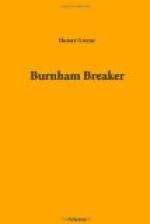Craft whispered to Sharpman that the request should be agreed to, saying that he could bring plenty of witnesses to prove that Rhyming Joe was a worthless adventurer, notorious for his habits of lying; and stoutly asserting that the boy was positively Ralph Burnham. But Sharpman’s great fear was that if Rhyming Joe should be brought back, the story of the bribery could no longer be hushed; and he therefore opposed the application for a continuance with all his energy.
The court ruled that the reasons presented were not sufficient to warrant the holding of a jury at this stage of the case for so long a time, but intimated that in the event of a verdict for the plaintiff a motion for a new trial might be favorably considered by the court.
“Then we have nothing further to offer,” said Goodlaw.
Sharpman resumed his seat with an air of satisfaction, and sat for full five minutes, with his face in his hand, in deep thought.
“I think,” he said, finally, looking up, “that we shall present nothing in rebuttal. The case, as it now stands, doesn’t seem to call for it.” He had been considering whether it would be safe and wise for him to go on the witness-stand and deny any portion of Ralph’s story. He had reached the conclusion that it would not. The risk was too great.
“Very well,” said the judge, taking up his pen, “then the evidence is closed. Mr. Goodlaw, are you ready to go to the jury?”
Goodlaw, who had been, during this time, holding a whispered conversation with Ralph, arose, bowed to the court, and turned to face the jurors. He began his speech by saying that, until the recent testimony given by the boy Ralph had been produced in court, he had not expected to address the jury at all; but that that testimony had so changed the whole tenor of the case as to make a brief argument for the defence an apparent necessity.
Fortified by the knowledge of the story that Rhyming Joe had told, as Ralph had just whispered it to him, Goodlaw was able to dissipate, greatly, the force of the plaintiff’s evidence, and to show how Craft’s whole story might easily be a cleverly concocted falsehood built upon a foundation of truth. He opened up to the wondering minds of the jurors the probable scheme which had been originated by these two plotters, Craft and Sharpman, to raise up an heir to the estates of Robert Burnham, an heir of whom Craft could be guardian, and a guardian of whom Sharpman could be attorney. He explained how the property and the funds that would thus come into their hands could be so managed as to leave a fortune in the pocket of each of them before they should have done with the estate.




